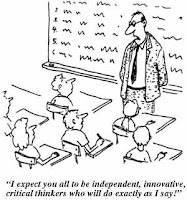Students have a right to privacy & free expression.

By Jay Stanley:
One of the technology-related civil liberties battles that ACLU affiliates around the country have been fighting in recent years involves defending students’ rights to privacy and free expression in the new electronic media that are becoming such a large part of their lives. For some reason many school officials seem to believe that when it comes to online communications, students have no such rights.
We have a case underway in Minnesota, for example, that exemplifies these problems. I got on the phone with Teresa Nelson, Legal Counsel at the ACLU of Minnesota, and she told me about it:
Our client, “R.S.,” is a typical 12-year-old middle school student. One day she posted on Facebook that she hated one particular hall monitor because “she was mean to me.” She made this post from home, on her own Facebook account, outside of school hours. Somehow her principal obtained a screen shot of this posting, and called R.S. into his office to talk to her about it. The school actually claimed that the 12-year-old girl had engaged in “bullying” of the adult hall monitor. R.S. received a disciplinary notice for being “rude/discourteous.”
Afterwards R.S. put up a Facebook post that said, “I want to know who the f%$# told on me.” That prompted a much swifter reaction. This time she was subject to a day of in-school suspension for “insubordination” and “dangerous, harmful, and nuisance substances and articles.” She was also barred from participating in her class ski trip.
Fast forward about a month. The parent of a middle school boy contacted the school and said R.S. had been chatting on Facebook with her son about sex. The boy later admitted to starting the conversation. But school officials called her in again to ask her about this private, off-campus conversation. Later in the day they pulled her out of class a second time, and this time brought her before a sheriff’s deputy, who was in uniform and wearing a Taser. They grilled her about the Facebook conversation, and then demanded that R.S. give them her Facebook and email passwords. R.S. felt highly intimidated by the police officer and two other adults, who pressured her and threatened her with detention.
The school officials then searched her private Facebook profile page, including private communications and things such as quizzes she’d taken. She sat there as they read through her private accounts, and they berated her over things they saw—chastised her for having taken boyfriend quizzes and sex quizzes, for example. She was humiliated. At the time, Facebook didn’t archive chat conversations, so the search didn’t actually reveal anything about the communications that had set off this search.
After they did the search, they notified her mom. R.S. was frightened and humiliated and didn’t want to go to school for several days afterwards. Ultimately there was no discipline against R.S. that came out of this. They weren’t even looking for violations of school rules—but they certainly didn’t find any.
The ACLU of Minnesota filed a complaint alleging violations of R.S.’s First and Fourth Amendment rights and seeking damages, a declaratory judgment, and injunctive relief to prevent the school from engaging in such conduct in the future. In July, the Minnewaska Area School District moved to have the case dismissed, but District Court Judge Michael J. Davis rejected the motion in August, holding that “the general rule that schools may not regulate merely inappropriate out-of-school speech” has been “well-established for decades.”
http://www.aclu.org/blog/technology-and-liberty-free-speech/school-principals-students-have-privacy-and-free-speech


